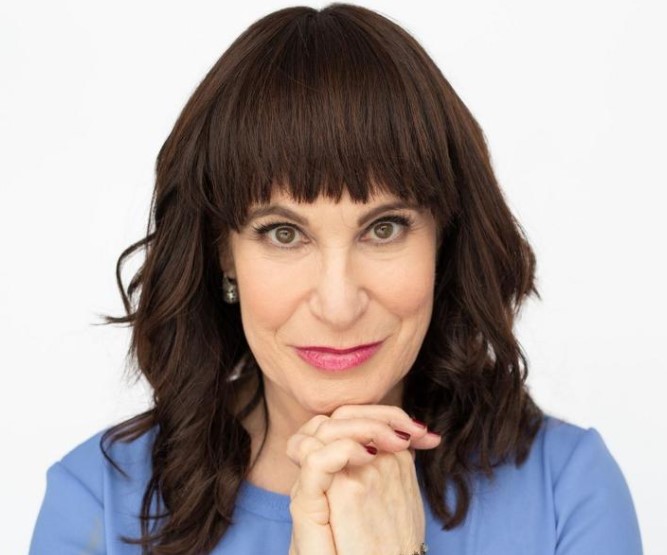
Adrienne Gold Davis was a Canadian television personality specializing in fashion, style, and beauty before becoming a senior lecturer and community liaison at the Village Shul in Toronto, as well as an international Jewish educator. Today she is the Director of Experience and Engagement for Momentum, an international movement focused on Jewish mothers, in the effort to bring a renaissance of Jewish values into the home, the community, the world!
Currently, Adrienne has her own Momentum morning podcast called Rise & Shine with Adrienne Gold Davis, featuring her signature combination of gentleness, wisdom, and hilarity. She and her husband live in Toronto and have two sons.
Q: Tell us about your “Esther moment” at the time of 9/11 when you were employed as a television personality?
I had been learning about Judaism for a year or two and I was the host of my own style and beauty show called Images with Adrienne Gold. I then went on to be a fashion and beauty contributor on Canada AM, which was very like Good Morning America. Much of my career was spent as a fashion journalist writing and broadcasting about style and beauty. My two sons were very small, and I had sent them to the day school in Toronto. This seemed natural because everyone around me was sending their kids to a Jewish day school and also because I felt so inept when it came to guiding my children – I couldn’t even help them at first grade level! I was 39 when my husband and I decided that we were going to learn a little more about Judaism. The more I learned, the more I realized “WOW! This is for me!”
So, there I was talking about what jacket to wear with which skirt and what shoes to match with which handbag. Suddenly, I was propelled from exclusively addressing issues of style to a deep fascination with issues of substance. I began to be a contributor on a Canadian morning show called Canada AM, where on Wednesday mornings I was part of a panel discussion. Often, we interviewed a famous star guest, usually an American celebrity. I could pretty much talk about whatever I wanted, but the conversation would often steer itself towards ethics and ideas. So, I started to talk about my Jewish journey, which provoked a lot of annoyance from producers who said to me, “What are you doing? This is not your platform for your ‘other’ life!”
It was the time of 9/11 and I was driving my car for a carpool when suddenly I heard about some planes that had crashed into the Twin Towers. I remember panicking because my children’s school had an Israeli flag prominently displayed in the front. My immediate thought was that they were going to blame Israel because everyone blames the Jews. So, I quickly decided that I was going to pick my kids up. I was two blocks from my synagogue and decided that I was going to stop there first. When I arrived, several rabbis were gathered around a small television set watching the news as the awful events were unfolding. One of the anchors where I worked at the time said, “Oh look, they are so happy about the planes crashing into the Twin Towers, that they were giving out candies in the streets of Palestine.” I got so upset and immediately called the television studio and yelled into the phone, “That is not Palestine; that is Israel. They are Arabs, not Jews, who were dancing in the streets.”
The rabbis overheard this and one of them turned to me and said something that would change my life forever. “Adrienne,” he said, “I think this is your ‘Esther moment,’’ referring of course to the historical Queen Esther who stepped up to the plate when her “Moment” presented itself to her and she seized it. “I don’t think it is a coincidence that you are on live television. If you don’t step up now, someone else will.”
At that point I began to commit career suicide. For a year one of my rabbis, Rabbi Shmuel Veffer, coached me on how to integrate Jewish thoughts and ideas into my television segments. I got endless letters from Christians because no one besides Christians ever mentioned G-d. Then I got a lot of insults and threats. I was warned to stop talking about morals and religion and stay in my ‘fashion’ lane. Needless to say, when my contract was up, it was not renewed. It was my ‘Esther moment’ and the reason that I was in the ‘palace’ of television. I spent close to 15 years working in television. But I knew at that moment that there was something more important that I had to do.
From then on, I wanted to share my new found pleasures and wisdom found in my spirituality. So, I went to my rabbi, Rabbi Ahron Hoch, and told him that I really wanted to teach women. He agreed and for the next 15 years, I taught women at the Village Shul in Toronto. About 13 years ago, I took a large group of women to Israel through the project Momentum, which at that time was called JWRP. Happily, I was asked to be a trip leader and I have been working with them since. More recently, I started my morning podcast Rise &Shine, which has been going strong for the last two years.
To take advantage of Adrienne’s Rise & Shine morning podcast that will hold you in a loving embrace, while guiding you through the challenges that you face, click Adrienne’s Rise & Shine Podcast
Q: What hashgacha pratit, Divine providence, did you witness in your life?
Five years into our marriage, while at my mother’s house, my husband Jason read in a newspaper article that he wouldn’t be able to be buried beside me because he was not Jewish. So he said to me, “Don’t you think that something happens after you die?” Yeah. “Worms and maggots happen,” I replied sarcastically. He then asked, “You don’t believe that there is life after death, do you? Well I do. There’s more than just this world. You know, I think that I am going to look into conversion if it is only just so that I can be buried beside you.”
Half-shocked, I said to him, “Knock yourself out. I am not coming with you!” Well, he did convert. He took a course and he realized that he wanted to keep kosher and shomer Shabbat, so he decided he wanted to do another conversion, this time conservative style. I had to come along and, I admit, I was very hostile about that. At that time, Jason, originally from Winnipeg, Manitoba, was 40 years old. He continued to learn and one day, he said gently, “Even though we are eating kosher food and separating milk from meat, I am not comfortable that our kitchen is truly kosher. We never kashered the kitchen properly. What can we do about it?”
“We can call Chabad,” I replied. So we did. A well-known rabbi from the local Chabad community came over and asked to see my husband’s conversion certificate; he took one look at it and his eyes filled with tears. “I don’t know how to break this to you,” he said, “you are a tzaddik. You are unbelievable! But here’s the issue: even if Adrienne never kept a single mitzvah, she will always be Jewish, by dint of her birth from a Jewish mother. But according to Jewish law, your conversion is not kosher (valid) and therefore you aren’t Jewish.”
Dead silence while that sunk in. I stood up, ready to exclaim, “How dare you!” and I raised my arm in protest at the rabbi, about to ask him to leave my house, whereupon my husband calmed me down by gently grabbing my hand and answered, “Yes. I know. I read about it. So let’s start again.” And here I was, thinking “NO! I don’t want to be religious.”
The next step meant going to a court of Jewish Law called a Beis Din. When we got inside, they asked my husband to leave the room. The dayan looked at me and said, “Your husband is a tzaddik, a righteous person. But you are the problem. If you are not on board with this, we can’t approve a conversion.” He then quoted a Talmudic saying (loosely translated here), “The Talmud says that a ‘good’ woman can turn a ‘bad’ man to righteousness, but a ‘bad’ woman can cause a ‘good man’ to fall from his good ways.” He continued, “You are immodest, you are arrogant, etc. I suggest that you go and learn more about Judaism, the religion of your birth, and if it speaks to you, then we will go ahead with Jason’s conversion.”
Boom! It spoke to me so loudly that I felt like my heart was exploding. That fall, we both began to learn in earnest and together fell in love with the Torah. Finally, when one child was eight years old and the other five, we went into the mikvah (purification water) again, after which the Beis Din held up the chuppah, with my husband’s hair still wet from his dipping into the mikvah.
That was over 20 years ago. In retrospect, my husband’s neshamah needed to wake up mine. I would say that my husband’s conversion and his insistence, honesty, and clarity was the turning point for me. Through that process, I learned how to work on my character shortfalls.
Q: What is your purpose in life?
My purpose in life – and this has been the case whether I was involved in fashion, beauty, Torah teaching, or anything else I have ever done – is to perceive the spark of G-dliness in every human being that I meet. The mailman, the person behind the counter, not just among the Jewish people, but among all nations.
